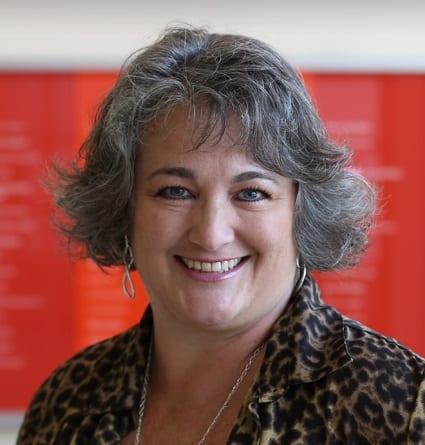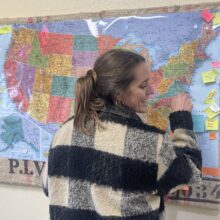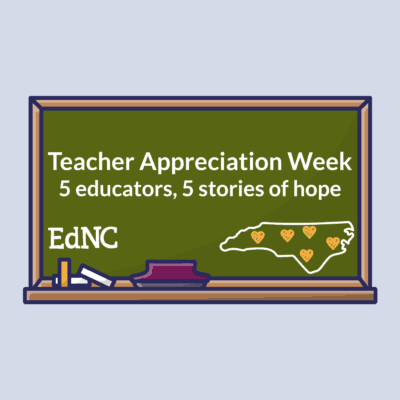Hollylynne Lee’s first teaching job was in Dare County in 1991. She started out as a mathematics teacher working in both middle and high school and loved it.
“I just got so excited about teaching students and thinking about math teaching, that I decided to go on for my master’s degree,” said Lee.
She returned to school, received her master’s, and while pursing her Ph.D. in mathematics education, became fascinated with how technology was shifting the ways we think about mathematics. She has now been at NC State for 20 years working on mathematics teacher education and performing research on how students and their educators learn with technology.


She is a teacher’s teacher, through and through. She recently received the UNC Board of Governors 2020 Award for Excellence in Teaching, a recognition given to one faculty member at each state public university for their extraordinary contributions. We talked with Lee about the joy of math and more. Find the interview, edited for length and clarity, below.
Parker: When did you decide you wanted to become a teacher?
Lee: I decided I wanted to become a teacher, probably sophomore year in college. I really liked mathematics, and I really felt like I just had a love of it that I wanted to kind of help others see the joy in it. My dad was an elementary teacher and so, everyone had been kind of suggesting that teaching might not be such a bad thing.
I really was kind of floundering at that time as far as what I wanted to do. And once I started taking some of the coursework in teaching, I thought it was really fascinating and interesting. I didn’t see myself applying my love for math by actually doing math day after day, but helping other people understand it seemed much more appealing to me.
Parker: What do you think is the hardest thing about teaching today?
Lee: I think that there’s a lot of accountability that teachers are held up to, sometimes unfairly. And trying to balance attention to these accountability measures with sparking the joy for learning at the same time with your students [can be difficult]. Keeping the joy for learning at the forefront and all of the accountability measures in the back.
You know, if you care for your kids and give them a good learning experience, then they should perform well and you’ll meet your accountability measures. But I think that’s a really hard balance for a lot of teachers because they’re in situations where there’s just lots of pressure to meet certain measures.
Like here locally in North Carolina, not having access to textbooks. It can be really hard to rely completely on electronic material, so teachers are often left to create their own curriculum to put things together. It can be exciting and invigorating for teachers, but it can also be exhausting.
Parker: You’ve described yourself as as an “educational designer.” Could you explain what that means?
Lee: Learning, I think, is a very interactive process. And so what educators do is they design those learning opportunities. And every choice that a teacher makes is a design choice. It’s designing how you’re going to ask a question.
What order are you going to put different examples in? What technology tool are you going to use? Why is that particular representation going to help students make sense of whatever phenomena or concept you’re discussing? All of that is a design process.
And so I treat my teaching as design. I’m really trying to orchestrate putting questioning and tasks and technology tools kind of all together in a sense-making way. I think about how I’m going to engage my students in those learning opportunities, and what sequence I’m going to put it in.
Parker: What quality do you think is most important in people who are becoming math teachers?
Lee: I really do think it is enjoying mathematics. It’s that you love mathematics, and you think critically that everyone’s not going to learn math the same way that you did. And so having that combination of this joy and love of math and this respect and knowledge that everyone doesn’t learn math in the same way. They might need different experiences than what you had. And so you have to take your joy in learning and understanding, and then think about it from a student’s perspective.
Parker: What are some things you’ve observed about education during the COVID-19 pandemic?
Lee: So one of the things that I decided to do when school closures started happening in mid-March was to start my online MOOC (Massive Open Online Courses) again. So the last couple years I have developed several free massive open online courses that I offer for math teachers, and I hadn’t offered any this year. For this particular semester at the university, I’m not teaching a class because I was bought out for doing my research.
And so I had all of my colleagues scrambling, saying, “Oh my gosh, we’re moving all of our classes online.” And I’m thinking, wow, I’m not doing that right now, and how could I use what I have to give back? So I decided to revise and open one of the MOOCs on teaching math with technology and revise it to actually bring in more stuff about teaching online, because the past version of the course didn’t have as much of that focus.
I’ve spent a lot of time over the last month and a half revising interacting with teachers. I have about 1,700 middle school and high school and a few elementary teachers enrolled in this course. What they’re talking about in the forums and what they write to me in emails is that they’re really using this time to start thinking differently.
It’s an opportunity for a lot of math teachers to think differently in ways that they haven’t done before and they are stepping up to the plate. They’re really thinking creatively, they’re using this time to kind of expand their own understanding of how to use technology to teach math, and they’re really excited to try new stuff. I mean, they are putting themselves out there in very creative ways to say, “Okay, I don’t have a choice but to do something different than what I’ve always done, so let me try something new.”
I think they’re really feeling empowered. They’re also exhausted, but I think they’re feeling very empowered by this. And they’re starting to envision even when they go back to seeing their students all the time face-to-face, that they’re not just going to go back to their same pedagogies, and they’re going to do things differently.
So I think that that brings hope. I think that right now, we had to see this kind of major shift, but when we go back, I think we’re going to see in-person classrooms, teachers, thinking differently about what interactions with their students look like, and what tools they could use to help them understand concepts.
Parker: Tell me more about how you navigated pulling your MOOC together so quickly.
Lee: All of my MOOCs are offered through the Friday Institute for Educational Innovation. The Friday Institute has a whole series of MOOCs for educators, and I have been involved in three of them. And so I contacted the tech team at the Friday Institute and said I know that my course was not supposed to be running this semester, but I really feel compelled to do this.
And they are really stretched in helping out with public schools, so I said I can do this by myself. They were incredibly supportive of letting me do this and I’ve been rolling with it since then. The course opened March 23 and I have been rolling out content week by week.
And what’s nice about the MOOCs is that, as long as I’m keeping it open until May 18, and as long as the teacher is registered by then, they have access to all the course materials. I even had somebody from a district up in Pennsylvania who in June wanted to run a professional development for their teachers using this course and wanted me to leave it open. I said I can’t, but your teachers will always have access to it if they enroll by May 18.
This particular course has run four different times before in the past, and the enrollment has ranged anywhere from about 400 to 600, so we have far surpassed that usual number.
Parker: What’s your favorite thing about teaching people how to teach?
Lee: My favorite thing about teaching people how to teach is actually when I’m hearing from them, the impacts they make on their students. I really do feel like I reach more students because I reach their teachers.
When I’m working with teachers and then they’re able to say, oh, I tried this in my classroom and this is what happened and, you know, I’m still struggling with how to do you know XYZ. And then we can further that conversation. And then they can report back what that impact was on their classroom and what their students maybe still struggled with, that’s just really exciting.
So I love that I’m able to kind of ignite that fire in a lot of teachers to really think about their work as an educator from a critical perspective and critical lens of, what decisions do they make that actually have good impact on their students.
Parker: If you would want people to know about one thing when it comes to teaching math teachers or the UNC system as a whole, what would that be?
Lee: I think math teachers are so incredibly important. As far as reaching all of our students, and making sure that we have math literate citizens, preparing people to have opportunities and options for them when they graduate high school. So being a math teacher is a really important and noble profession.
I hope that lots of young people consider that it’s a great career, and you know that as a math teacher I think that we all know that our role is so important. In not just attracting good teachers, or people who are interested in being teachers, but retaining them, keeping their them excited. It’s important they feel like a professional and have different ways they can express their love and creativity for math in the classroom with students.


